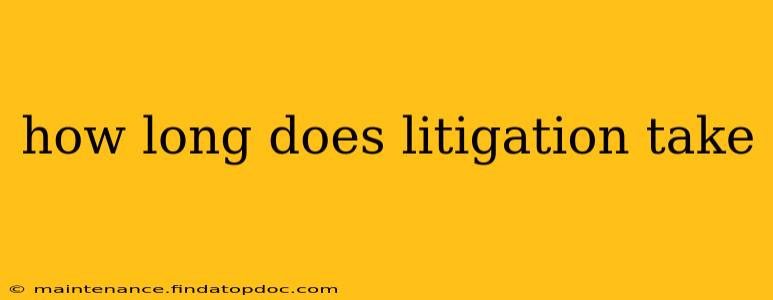Litigation, the process of resolving disputes through the court system, is notoriously unpredictable in terms of timeline. There's no single answer to the question, "How long does litigation take?" as the duration varies dramatically based on numerous factors. This guide will delve into those factors and provide a clearer understanding of what influences the length of a lawsuit.
What Factors Determine the Length of Litigation?
Several key elements significantly impact the timeline of a lawsuit. Understanding these factors will help you better anticipate the potential duration of your own case.
1. Complexity of the Case:
This is arguably the most significant factor. Simple cases involving straightforward facts and clear legal issues tend to resolve much faster than complex ones. Complex cases might involve numerous parties, extensive discovery (the process of gathering evidence), intricate legal arguments, and potentially expert witness testimony. These complexities can easily stretch a case out for years.
2. Type of Case:
Different types of cases have different procedural timelines. For example, a straightforward breach of contract case might be resolved relatively quickly compared to a protracted patent infringement lawsuit or a complex class-action case. Criminal cases often have stricter deadlines imposed by the court, while civil cases offer more flexibility, potentially leading to longer durations.
3. Jurisdiction:
The court's jurisdiction significantly influences the process's speed. Some jurisdictions are known for their faster case processing times than others, due to varying caseloads, judicial efficiency, and local rules.
4. Discovery Process:
The discovery phase, where both sides exchange information and evidence, can be extremely time-consuming. Disputes over discovery requests, motions to compel production of evidence, and extensive document review can easily add months or even years to the litigation timeline.
5. Settlement Negotiations:
Many cases settle before trial. The willingness of the parties to negotiate and reach a mutually agreeable resolution directly impacts the overall length of the litigation. Successful settlement negotiations can significantly shorten the process, while protracted or unsuccessful negotiations can prolong it.
6. Judicial Backlog:
Court backlogs are a significant concern in many jurisdictions. Overburdened courts can lead to delays in scheduling hearings, trials, and other procedural steps, ultimately increasing the time it takes to resolve a case.
7. Appeals:
If either party is dissatisfied with the trial court's decision, they can appeal to a higher court. Appeals add significant time to the overall litigation process, as the appeals court reviews the lower court's decision and may issue its own ruling.
How Long Does Litigation Typically Take?
While there's no definitive answer, some general observations can be made:
- Simple cases: Might resolve within a few months to a year.
- Moderately complex cases: Could take one to three years.
- Highly complex cases: May last three years or more, potentially extending to five years or even longer.
What are the stages of litigation?
Understanding the various stages of litigation will provide a better grasp of the potential timeline:
- Pleadings: Initial documents filed outlining the claims and defenses.
- Discovery: Exchange of information and evidence between parties.
- Motion practice: Filing and resolution of motions related to the case.
- Trial: Presentation of evidence and arguments before a judge or jury.
- Post-trial proceedings: Potential motions for new trials or judgments notwithstanding the verdict.
- Appeals: Review of the trial court's decision by a higher court.
Frequently Asked Questions (FAQs)
How long does a simple personal injury case take? Simple personal injury cases can often resolve within a year, but more complex cases involving significant injuries or disputes over liability can take considerably longer.
How long does a divorce case take? The length of a divorce case varies significantly based on the complexity of the marital assets, child custody arrangements, and the level of agreement between the parties. Uncontested divorces are typically faster than contested ones.
How long does a small claims case take? Small claims court is designed for quick resolution of smaller disputes. These cases often conclude within a few months.
Can I speed up the litigation process? While you can't guarantee a faster resolution, proactive communication with your attorney, cooperation in the discovery process, and a willingness to consider settlement can all contribute to a more efficient timeline.
This information is for educational purposes only and should not be considered legal advice. It is crucial to consult with an experienced attorney for guidance on your specific legal matter. The complexity and unique circumstances of your case will determine its duration.
